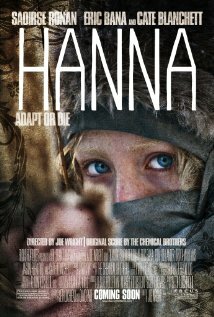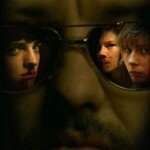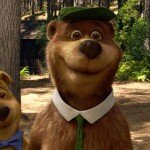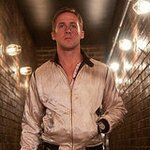Joe Wright overcomes an unremarkable plot with distinctive direction in Hanna, a beat-driven action/art-house hybrid that blends East-European iconography with Grimm fairytale fancy. A departure for the English director, best known for his austere costume dramas including Atonement and the most recent Pride and Prejudice adaptation, the film follows an adolescent girl (Saoirse Ronan) who has been trained by her secret-agent father (Eric Bana) as a cold blooded killer while hiding in the arctic circle, so that she might one day avenge her mothers’ death at the hands of the malevolent CIA operative Marissa Wiegler (Cate Blanchett). Through his inspired choice of locales, striking camera work, fast paced editing and excellent utilization of a pulsating electronic score, Wright has crafted a unique and exciting film with a style and personality all of its own.
Hanna is a perfect example of visual filmmaking elevating a substandard story. From the opening shots set against a stark white tundra, there is an elegance and artistry to Wrights framing and cinematography. As our young but very dangerous protagonist is forced to run from the forces suddenly pursuing her, the landscapes shift, from the barren reds of a rocky dessert to the formless greys of a German city, before arrives in it’s climax: in the off-kilter dreamscape of a dilapidated fairy-tale themed amusement park.
As the locations change, so too does Hanna, as she is offered for the first time to the possibility of a different kind of life. A scene in which she tentatively kisses another girl whom she has befriended plays less like Hanna exploring her sexuality, and more like her exploring for the first time the possibility of being truly close with another human being. It’s a wonderful, tender moment, and Wright lights and films it with a simple warmth and grace.
It helps that young actress and – mark my words – future Oscar winner Saoirse Ronan absolutely embodies the lead role, playing Hanna with the perfect combination of trepidation, mettle and steel. Her adult co-stars are likewise committed, ridiculous accents and all. Eric Bana is stoically bad-ass as Hanna’s father, while Cate Blanchett is clearly relishing her part as the evil stepmother of the piece, the silkily Southern Marissa Wiegler.
![Hanna-Stills_003[1] hanna stills 0031 e1313632632271 600x274 Hanna (Review)](/wp-content/uploads/hanna-stills_0031-e1313632632271-600x274.jpg)
Wright also injects considerable personality into the action, shooting fist fights, gun battles and chase scenes in a variety of different ways. From Bourne style shaky-cam, POV, slow motion and even one particularly impressive sequence shot in a single extended take, it’s as if Wright, a man who’s never really had the chance to shoot action before, is playing around with all the toys in the toy-box, testing out every style and method to see which one suits him best. Even better, it’s all edited perfectly in time with the dynamic score from electronic music duo The Chemical Brothers, the pulsating rhythms of which propel the characters through the story at break-neck speed.
In the hands of a lesser director, Hanna could have been any other generic spy movie. Instead Wright has offered up a savvy mix of genres and styles; a film that resembles a kind of live-action adaptation of an underground graphic novel inspired, in equal parts, by James Bond and Little Red Riding Hood. Hanna is artistic, entertaining and a little bit inspired.
 Follow the author Tom Clift on Twitter.
Follow the author Tom Clift on Twitter.












